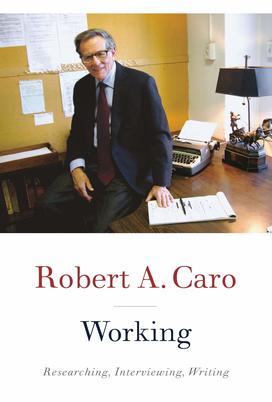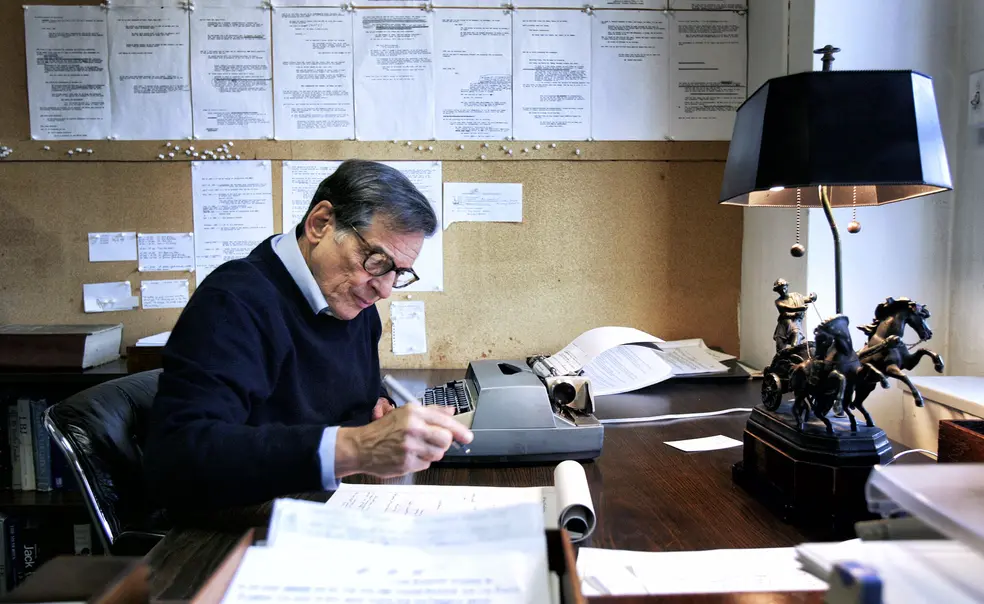Robert Caro ’57 Shows his Work in “Working”
The book: In Working (Knopf), Robert Caro ’57 provides a behind-the-scenes account of his experience writing the Pulitzer Prize winning biographies of New York developer Roberts Moses and President Lyndon B. Johnson. From interviewing Moses to wading through the vast collection of writings in Johnson’s presidential library, Caro provides new insights into the men he wrote about and his motivation for writing about them.
Caro is legendary for his writing process, taking at times more than a decade to write each book. In Working, Caro walks readers through this process, providing memorable anecdotes, including the story of how he tracked down a former voting official who admitted to helping Johnson steal the 1948 Senate election. Caro looks back on his early years, writing for the Daily Home News out of Princeton, for a political boss in New Brunswick, and for Newsday, before receiving a small advance to start writing his first biography, Power Broker, which was about Moses.
The author: Robert Caro ’57 is a two-time Pulitzer Prize winning author for his biographies of Robert Moses and Lyndon N. Johnson. Caro has also won the National Book Critics Circle Award, the National Book Award, and the Gold Medal in Biography from the American Academy of Arts and Letters. In 2010, he was awarded the National Humanities Award by President Barack Obama. Caro is currently writing the fifth and final volume of his biographies of Johnson.

Why political power? Because political power shapes all of our lives. It shapes your life in little ways that you might not even think about. For example, when you’re driving up to the Triborough (now Robert F. Kennedy) Bridge in Manhattan in New York, you may notice that the bridge comes down across the East River in Queens opposite 100th Street. So why do you have to drive all the way up from 100th Street to 125th Street to cross it, and then basically drive back, which adds almost three totally unnecessary miles to every journey across the bridge.
Well, the reason is political power. In 1934, Robert Moses was trying to get the Triborough Bridge built, and he couldn’t because there wasn’t enough public or political support for the project. William Randolph Hearst, the publisher of three influential newspapers in New York, owned a block of tenements on 125th Street. Before the Depression, the tenements had been profitable, but now poor people didn’t have jobs, and couldn’t pay their rent. Hearst was losing money on the buildings and he wanted the city to take them off his hands by condemning them for some project. Robert Moses saw that the project could be the Triborough Bridge, and that’s why the bridge entrance is at 125th Street. That’s a small way in which political power affects your life. But there are larger ways, too.
Every time a young man or woman goes to college on a federal education bill passed by Lyndon Johnson, that’s political power. Every time an elderly man or woman, or an impoverished man or woman of any age, gets a doctor’s bill or a hospital bill and sees that it’s been paid by Medicare or Medicaid, that’s political power. Every time a black man or woman is able to walk into a voting booth in the South because of Lyndon Johnson’s Voting Rights Act, that’s political power. And so, unfortunately, is a young man — 58,000 young American men — dying a needless death in Vietnam. That’s political power. It affects your life in all sorts of ways. My books are an attempt to analyze and explain that power.
Reviews: “Iridescent, so many brilliant refractions of light from his hard slog of discovering what life has really meant for the people in his narratives, the powerful and the powerless ... Caro wanted the reader to feel for them, empathize with their ambitions and their torments. At 83, in book after book and now in this semi-memoir, he has succeeded to a breathtaking degree ... How Caro finds what he needs to know … is par for the author’s tenacity, his charm and his investigative genius, no other word for it ... Nearly 200 years ago, James Madison commanded that a people who mean to be their own governors must arm themselves with the power that knowledge gives. Robert Caro ... has performed great deeds in that cause, but he has also measurably enriched our lives with his intellectual rigor, his compassion, his openness, his wit and grace.” —Harold Evans, The New York Times Book Review












No responses yet